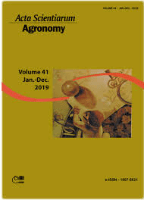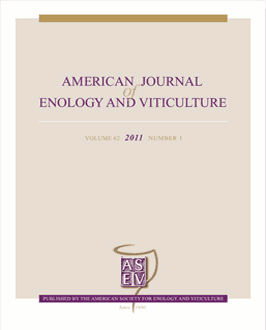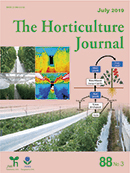
VITIS
metrics 2024
Transforming Vine Science into Practical Insights
Introduction
VITIS is a distinguished journal published by the Julius Kuhn Institute (JKI), based in Germany, dedicated to advancing the field of viticulture and enology. With a long-standing history dating back to 1981, VITIS serves as a vital platform for researchers, professionals, and students alike, focusing on critical insights and innovations related to vine genetics, cultivation, and grape quality. Although the journal operates under a traditional access model, its commitment to publishing high-quality, peer-reviewed research contributes to its relevance, as indicated by its current rankings of Q4 in Genetics and Q3 in Horticulture for 2023. Furthermore, with its Scopus rankings placing it within the agricultural and biological sciences community, VITIS plays an essential role in disseminating vital knowledge to enhance viticultural practices. Researchers and practitioners are encouraged to explore the breadth of studies published, contributing to the ongoing dialogue in horticulture and plant genetics.
Metrics 2024
 0.26
0.26 1.10
1.10 1.30
1.30 55
55Metrics History
Rank 2024
Scopus
IF (Web Of Science)
JCI (Web Of Science)
Quartile History
Similar Journals

ACTA SCIENTIARUM-AGRONOMY
Exploring the frontiers of crop science and sustainability.ACTA SCIENTIARUM-AGRONOMY is a prestigious, peer-reviewed journal published by UNIV ESTADUAL MARINGA, PRO-REITORIA PESQUISA POS-GRADUACAO, focusing on advanced research in the field of agronomy and crop science. Since its inception as an Open Access journal in 2007, it has significantly contributed to disseminating high-quality research, allowing unrestricted access to its content for a global audience. Operating from Brazil, the journal holds a notable Q2 category ranking in Agronomy and Crop Science as of 2023, validating its importance within the academic community. The journal’s Scopus ranking positions it in the 49th percentile among Agricultural and Biological Sciences, indicating a robust foundation for impactful research. With a commitment to innovation and scientific excellence, ACTA SCIENTIARUM-AGRONOMY aims to provide researchers, professionals, and students with vital insights that drive forward our understanding of agriculture and its environmental implications.

AMERICAN JOURNAL OF ENOLOGY AND VITICULTURE
Elevating Standards in Wine Science and Horticulture.The American Journal of Enology and Viticulture, published by the American Society of Enology and Viticulture, serves as a pivotal platform for scholarly research in the disciplines of enology and viticulture. With a distinguished ISSN of 0002-9254 and an E-ISSN of 1943-7749, this esteemed journal has been contributing significant insights since its inception in 1973. Currently residing in the prestigious Q2 category for both Food Science and Horticulture, it ranks impressively among its peers, standing at #27 out of 115 in the Horticulture sector and #165 out of 389 in Food Science, reflecting its impact and relevance in agricultural research. The journal offers a wealth of valuable research articles, reviews, and studies that explore the intricacies of grape cultivation and wine production, making it an indispensable resource for researchers, professionals, and students keen on advancing their knowledge in these fields. Although it does not currently operate under an open-access model, the rigorous peer-review process ensures that only high-quality, scientifically sound content is disseminated, promoting innovation and collaboration in the pursuit of excellence in viticulture and enology.

Turkish Journal of Field Crops
Exploring Solutions for Global Agricultural ChallengesTurkish Journal of Field Crops is a prestigious peer-reviewed publication dedicated to advancing the field of agronomy and crop science, published by the Society of Field Crop Science. With an ISSN of 1301-1111, this journal serves as a crucial platform for researchers and professionals to disseminate innovative findings and discuss practical applications in crop cultivation and management. Hailing from Turkey, it aims to address the pressing challenges facing agriculture in both regional and global contexts, particularly over its converged years from 2009 to 2024. As a Q3 ranked journal in the Agronomy and Crop Science category with a Scopus ranking of #259/406 and a percentile of 36th, it fosters high-quality research that contributes to the sustainable development of field crops. Though it operates under various access options, this journal is committed to providing valuable insights into agronomic practices, aiming to bridge the gap between theory and application for scientists, educators, and practitioners alike.

MAYDICA
Advancing agricultural science through rigorous research.MAYDICA is an esteemed scholarly journal dedicated to advancing knowledge in the fields of Agronomy, Crop Science, Genetics, and Plant Science, with a commitment to disseminating high-quality research that influences practices and policies in agriculture and crop management. Published by MAYDICA-IST SPER CEREALICOLTUR and based in Italy, the journal has been a pivotal resource for researchers since its inception in 1993. The journal is currently ranked in the Q3 category for Agronomy and Crop Science and Q4 for both Genetics and Plant Science, reflecting its growing impact within the academic community. Although it operates without open access, its rigorous peer-review process ensures the integrity and relevance of the research it publishes. MAYDICA seeks to foster collaboration among scientists, practitioners, and students, encouraging the exchange of innovative ideas and methodologies that address contemporary challenges in agricultural sciences. With a focus on timely research and developments, MAYDICA is an essential platform for those looking to enhance their understanding and application of agricultural advancements.

Legume Research
Championing Legume Research for a Resilient TomorrowLegume Research, published by the AGRICULTURAL RESEARCH COMMUNICATION CENTRE in India, is an essential peer-reviewed journal focusing on advancements in the field of agronomy, crop science, soil science, and plant science. With an ISSN of 0250-5371 and operating since 2008, this journal caters to researchers, agricultural professionals, and students interested in the critical role of legumes in sustainable agriculture and food security. It ranks within the third quartile (Q3) in several prominent categories, reflecting its contribution to the agricultural and biological sciences community—ranking #279 in Agronomy and Crop Science, #113 in Soil Science, and #376 in Plant Science based on Scopus metrics. Although not open access, Legume Research remains a vital resource for those seeking to enhance their knowledge and contribute novel research findings in the ever-evolving discipline of legume cultivation and utilization. With a clear objective to disseminate impactful research, this journal significantly contributes to the global understanding of legumes' ecological, economic, and nutritional importance.

AMERICAN JOURNAL OF POTATO RESEARCH
Fostering Global Research in Potato AgricultureAMERICAN JOURNAL OF POTATO RESEARCH is a prominent scholarly journal dedicated to the field of potato research, encompassing vital areas of Agronomy and Crop Science. Published by SPRINGER, this journal holds an impactful presence in the scientific community, as evidenced by its placement in the Q2 quartile of both Agronomy and Plant Science categories for 2023. With a Scopus rank of #145 out of 406 in Agricultural and Biological Sciences, it offers a significant platform for researchers, professionals, and students alike. Covering diverse topics from cultivation techniques to pest management, the journal aims to advance understanding and innovation in potato science, facilitating the sharing of cutting-edge research and fostering collaboration among scholars. Accessible to a global audience, the journal encourages the dissemination of knowledge through its open-access options. Since its inception in 1998, the AMERICAN JOURNAL OF POTATO RESEARCH has been committed to contributing valuable insights that drive the industry forward and support sustainable agricultural practices.

Erwerbs-Obstbau
Nurturing Insights for Fruitful Research.Erwerbs-Obstbau is a pivotal journal dedicated to the field of horticulture, focusing on research concerning the cultivation and production of fruit. Published by Springer in Germany, this journal plays a crucial role in disseminating innovative findings and advancing the knowledge base within the agricultural and biological sciences landscape. With an impact factor that places it in the Q3 category of horticultural journals, it ranks #68 out of 115 in its field according to Scopus, demonstrating its relevance and contribution to ongoing debates and advancements in horticulture practices. Researchers, professionals, and students benefit from the insights and developments shared in its pages, as the journal has been successfully converging data and insights since its inception in 1983, including continuous contributions from 1996 to the present. Although the journal currently does not offer Open Access, its comprehensive articles are invaluable for anyone invested in the science of fruit cultivation and production.

SOUTH AFRICAN JOURNAL OF ENOLOGY AND VITICULTURE
Pioneering Discoveries in Enology and HorticultureThe South African Journal of Enology and Viticulture, published by the South African Society of Enology and Viticulture (SASEV), stands as a pivotal platform for research in the fields of enology and viticulture. With an ISSN of 0253-939X and E-ISSN 2224-7904, this Open Access journal has been contributing significant scholarly work since 1980, ensuring accessibility to a broad audience of researchers, professionals, and students engaged in the viticulture and winemaking sectors. Based in Stellenbosch, South Africa, the journal has achieved commendable Q3 rankings in the fields of Food Science and Horticulture as of 2023, reflecting its growing influence in these areas. With a comprehensive converged publishing span from 2004 to 2024, the journal seeks to expand the frontiers of knowledge by publishing innovative research, reviews, and case studies that address current challenges and advancements in viticulture and enology. Researchers engaged in agricultural and biological sciences will find valuable insights, as highlighted by its Scopus ranks, particularly in horticulture (Rank #46/115) and food science (Rank #215/389), placing it in the th percentile of international academic standards.

Egyptian Journal of Agronomy
Fostering Growth in Agricultural Research and InnovationEgyptian Journal of Agronomy, published by the NATL INFORMATION DOCUMENTATION CENT, ACAD SCIENTIFIC RESEARCH & TECHNOLOGY, serves as a pivotal platform for researchers, professionals, and students focusing on various disciplines within the agricultural sciences, including agronomy, soil science, horticulture, and ecology. With an ISSN of 0379-3575 and E-ISSN of 2357-0288, the journal aims to bridge the gap in knowledge and innovation in the field with its comprehensive studies and frameworks. While the journal is currently categorized in low Scopus ranks, indicating immense potential for growth in influence and impact, it remains dedicated to providing quality research and fostering advancements in agronomic practices. Set in Egypt, a hub for agricultural research, the journal is committed to reflecting the regional and global challenges in agriculture. The Egyptian Journal of Agronomy is a vital resource for anyone engaged in the evolving landscape of agricultural science, offering insights that promote sustainable practices and address current issues facing the sector.

Horticulture Journal
Connecting Researchers to Sustainable SolutionsThe Horticulture Journal, published by the Japan Society for Horticultural Science, is a leading academic platform dedicated to the advancement of horticultural research and practices. With an ISSN of 2189-0102 and an E-ISSN of 2189-0110, this journal endeavors to publish high-quality research that emphasizes innovative techniques, sustainable practices, and the science of plant cultivation. The journal has been recognized for its impact within the field, currently holding a Q2 ranking in Horticulture and a Q3 ranking in Plant Science as of 2023, indicating its significant contribution to advancing knowledge. With its open-access model, researchers, professionals, and students have the opportunity to engage with the latest findings, thanks to the journal's commitment to widespread dissemination of information. Since its convergence period began in 2015 and continuing through to 2024, the Horticulture Journal remains instrumental in promoting sustainable and beneficial practices in horticulture science globally.